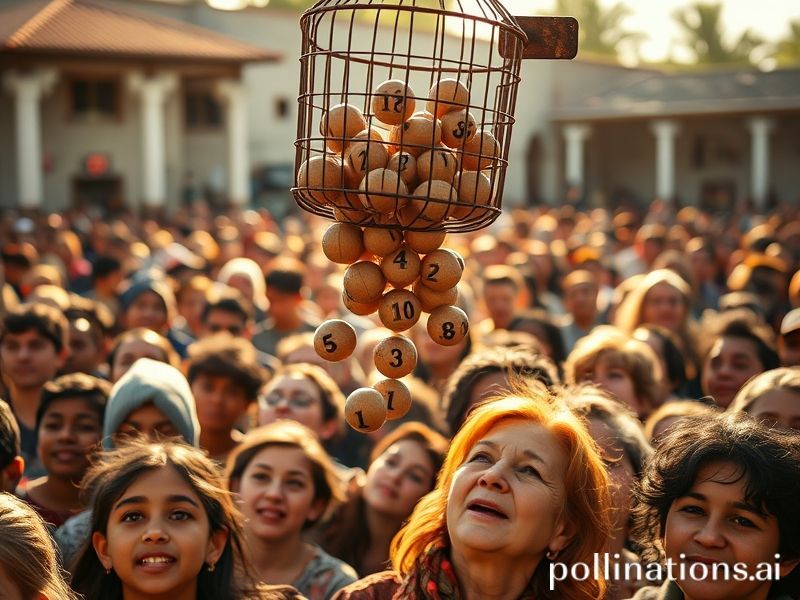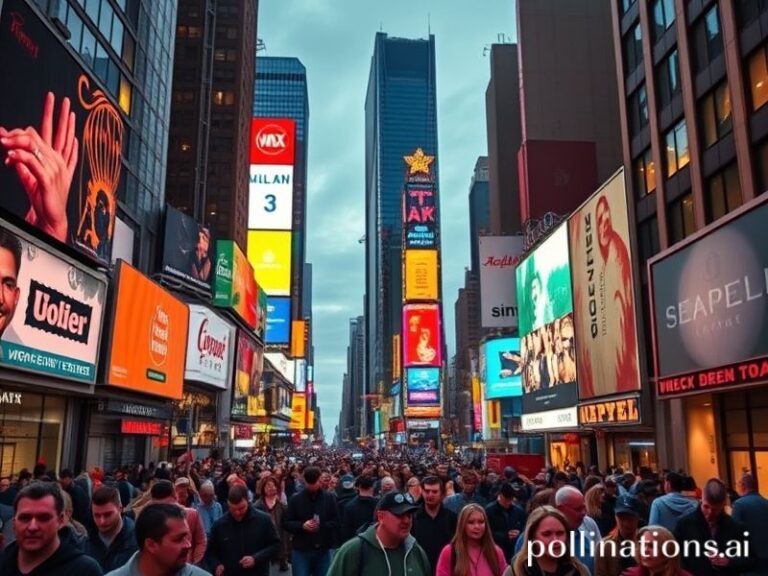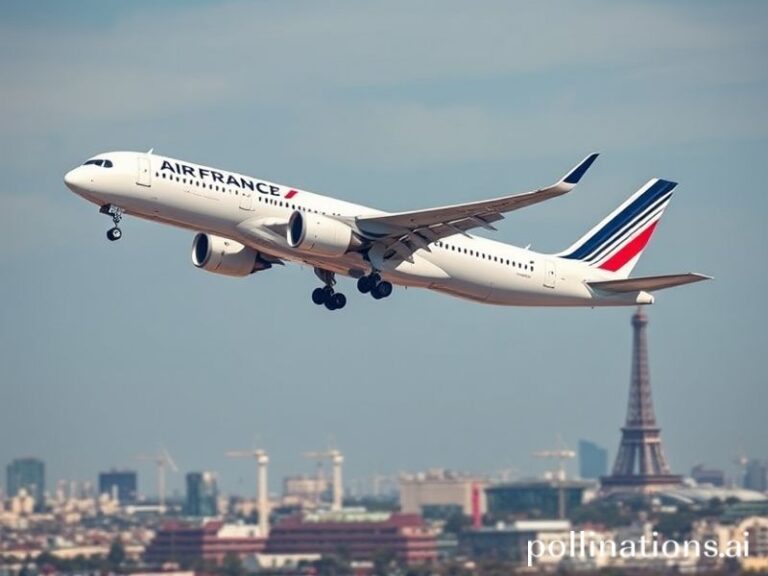The World’s €1.4 Trillion Group Therapy Session: Inside the Global People’s Lottery
The People’s Lottery: When the Whole Planet Buys the Same Ticket
By Diego “Lucky” Morales, International Correspondent-at-Large, currently hiding from my bookie in Lisbon
They say lotteries are taxes on people who are bad at math. If that’s true, the newly christened “People’s Lottery” is the first truly global fiscal policy—voluntary, enthusiastic, and administered not by any Ministry of Finance but by an algorithm that lives somewhere between Malta and the Delaware shell company that claims not to own it.
Picture it: every 168 hours, 2.7 billion phones chirp in 47 languages, all announcing the same six numbers. From Lagos laundromats to Lapland saunas, humanity synchronizes its disappointment. The jackpot—currently hovering around €1.4 trillion, or roughly the GDP of Spain if Spain had remembered to invoice for sunshine—rolls over faster than a Russian oligarch’s yacht registry. Ticket price? A single unit of the local currency, automatically debited from whatever fintech wallet your government hasn’t outlawed yet. You don’t even have to remember to play; the app opts you in by default, like a digital herpes flare-up.
Why are we doing this to ourselves? International observers—those poor souls still pretending economics is a science—cite three converging trends: post-pandemic desperation for “any wealth at all,” the collapse of traditional pensions (RIP, compound interest, we hardly knew ye), and the fact that TikTok influencers have made “being poor ironically” less cute than it was in 2020. The People’s Lottery sells hope in single-serving sachets, cheaper than coffee and twice as addictive.
Naturally, governments are thrilled. In Argentina, inflation is so rampant that the lottery payout is indexed to the blue-chip swap rate plus the price of a kilo of asado. In the United Kingdom—where Brexit has reduced the national pastime to blaming Brussels for rain—Downing Street quietly pockets 48% of each ticket, calling it a “sovereign wealth participation mechanism.” Even the Swiss, who already have more discreet gold than James Bond’s dentist, joined last month, proving neutrality is negotiable when the house edge is 52%.
The darker corners of the planet are not missing the party. North Korea’s state news agency insists Kim Jong-un won the inaugural draw, citing a ticket purchased with “Supreme Leader’s Lucky Tears.” Meanwhile, El Salvador’s president has promised to adopt the jackpot as legal tender, provided it can be subdivided into satoshis and tattooed on a volcano. Somewhere in the metaverse, Mark Zuckerberg is reportedly building a virtual ticket booth that charges gas fees in eyeball-tracking data. He calls it “community engagement.”
Humanitarian watchdogs warn that the lottery’s universal buy-in is widening the inequality gap. Their latest report—titled “When the Poor Stop Buying Bread and Start Buying Numbers”—notes that rural Kenyans now spend 11% of household income chasing a jackpot that statistically won’t land within 19,000 years. The UN briefly floated a resolution condemning the practice, but the ambassador from Malta filibustered by reading the odds aloud until everyone fell asleep.
And yet, there is undeniable poetry in the shared delusion. Last week a Syrian refugee in Istanbul, a Tokyo Uber driver, and a retired Welsh sheep farmer all matched five numbers and split the second-tier prize. They met on Zoom to celebrate; the interpreter billed extra for translating “Are we millionaires after currency conversion or just less in debt?” into three dialects. For twenty-four glorious hours, Twitter forgot to be outraged.
Economists call this “the redistribution of irrationality.” I call it the first truly global ritual since we all agreed to hate the sound of our own voice on recordings. The People’s Lottery may not fix climate change, vaccine inequity, or the fact that airlines still pretend a bag of pretzels is dinner. But it does offer a weekly moment when the entire species agrees on one thing: maybe this time the universe will pick me, despite everything it has seen me do.
Of course, the draw remains random. The only sure winner is the house—a Cayman-registered entity whose board includes three former finance ministers, a TikTok astrologer, and, rumor has it, a golden retriever with better crypto instincts than most portfolio managers. Their latest prospectus lists “planetary resignation” as a growth sector.
Until the jackpot finally implodes—either mathematically or morally—billions will keep tapping “Confirm Purchase” with the resigned optimism of someone re-entering a bad marriage for the catering. After all, in a world where interest rates are negative and the Arctic is on fire, the People’s Lottery offers the rarest commodity of all: a scheduled miracle. Just remember to read the fine print. The odds of winning are printed in 6-point font, but the odds of being disappointed are 100%, and always have been.







